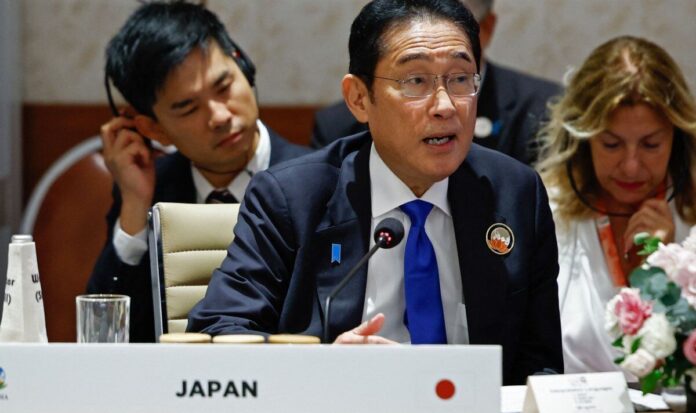Japan’s Prime Minister Fumio Kishida attends a session at the G20 summit (Image: Getty) It follows a G20 summit in which the US and its allies paid particular attention to the world’s developing economies. The Japan-UK Strategic Economic and Trade Policy Dialogue, signed by trade secretary Kemi Badenoch and Japanese counterpart Yasutoshi Nishimura, aims at securing the supply of minerals which are essential to such environmentally friendly technologies as electric vehicles and wind power – without having to rely on China. Africa contains almost half the world’s Cobalt, 85 percent of the world’s manganese, 47 percent of the world’s cobalt, 6 percent of copper and 5 percent of the world’s lithium – all vital to the production of batteries. Crucially, both nations want to regain ground lost to Beijing. which has invested billions in the extraction of critical minerals from Africa. The former British colony is famed for having an abundance of both nickel and cobalt. Separately, Britain and South Africa have agreed to hold a regular ministerial dialogue on critical minerals. The PM has been encouraged to focus on Anglo-Japanese cooperation (Image: Getty) Under the new deal, Japan will help to financially consolidate new networks opened up by the UK. Mutually-held concerns over China have led to a dramatic warming of relations between Japan and the UK, which in July became the first western nation to join the CPTPP trans-pacific trading bloc. In July both countries signed an unprecedented defence pact allowing both nations to rapidly deploy forces in one another’s countries. And both are jointly producing a new generation fighter jet, along with Italy. Africa expert Professor Nick Westcott of SOAS University of London, said: ‘China has a head start in the race for climate critical minerals. ‘No one batted an eye while China’s economy was opening up to the world. But now, with escalating economic tensions, people are waking up to the fact that, quietly, while no-one was really looking, China has built up a dominant position in the trade of essential minerals, rare earths and copper out of Africa.” “China does not have a monopoly. But it is dominant, and the rest of the world needs to compete more vigorously. ‘Chinese-controlled companies may, for example, prefer to sell to China than put the minerals on the world market.’ While the cost of replicating the levels of Chinese investment is prohibitive for most nations, Anglo-Japanese cooperation makes sense, said Prof Westcott. ‘The UK simply isn’t a big enough market on its own. But with Japan, you have a sizable market and expertise in processing these minerals which the UK doesn’t have” “So there is a logical case for commercial cooperation. And increasing investment into Africa would itself be a good thing.’ Benedict Manzin, of the Sibylline strategic risk group, said it was vital to shore up supply chains which do not rely on China. ‘There are all sorts of movements to build resilience in the eventuality that we end up in a more adversarial relationship with China, We don’t want to be dependent on China in any way,’ he said. He warned that the possibility of the world’s democracies losing leverage to China was another vital concern. ‘China dominates so much of the mineral market – and the prospect of it capturing Taiwan makes this worse. There is real concern about how effectively the West and allies like Japan would effectively be able to impose sanctions on China in the future. ‘What leverage would we have?’ But China’s decision to withdraw from some African nations after accusations that it caused debt traps may present an opportunity. ‘China has changed its strategy and is cutting down direct investment into the region. This means we have an opportunity here,” he said. “And this is happening as major players at the G20 talk about the need to properly engage with Africa and support development “But we have heard this before. “After Brexit there was an appeal to return to the Commonwealth and utilise a network of countries with UK links. “It is time to actually follow through with this in Africa.”
Britain and Japan team up against China in hunt for rare African minerals
Sourceexpress.co.uk
RELATED ARTICLES


